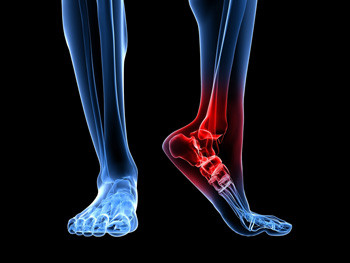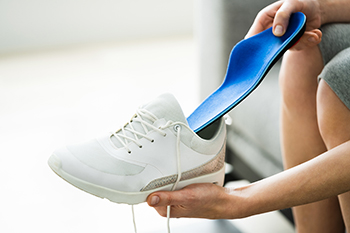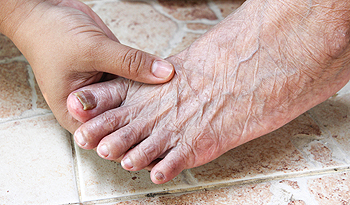Items filtered by date: February 2022
Where Heel Pain Can Come From
 Heel pain can be debilitating and have a brutal impact on everyday life. While there are a variety of causes of heel pain, the most common is plantar fasciitis. This happens when there is inflammation or even a partial tear in the tissue running along the bottom of the foot that connects the heel to the toes, known as the plantar fascia. Heel pain can also occur when there is an abnormal growth on the heel bone that is a result of a calcium buildup. This is known as a heel spur. Other common sources of heel pain include Calcaneal apophysitis (irritation of the heel bone from new shoes or a new activity), bursitis (inflammation of the sac that lines some joints), or when a nerve gets compressed (also known as a trapped nerve). If you are struggling with heel pain, consulting with a podiatrist is a good idea. A podiatrist will be able to find the cause of the heel pain and suggest the treatment options that are available.
Heel pain can be debilitating and have a brutal impact on everyday life. While there are a variety of causes of heel pain, the most common is plantar fasciitis. This happens when there is inflammation or even a partial tear in the tissue running along the bottom of the foot that connects the heel to the toes, known as the plantar fascia. Heel pain can also occur when there is an abnormal growth on the heel bone that is a result of a calcium buildup. This is known as a heel spur. Other common sources of heel pain include Calcaneal apophysitis (irritation of the heel bone from new shoes or a new activity), bursitis (inflammation of the sac that lines some joints), or when a nerve gets compressed (also known as a trapped nerve). If you are struggling with heel pain, consulting with a podiatrist is a good idea. A podiatrist will be able to find the cause of the heel pain and suggest the treatment options that are available.
Many people suffer from bouts of heel pain. For more information, contact Dr. Ronald Sheppard of Warren-Watchung Podiatry Center. Our doctor can provide the care you need to keep you pain-free and on your feet.
Causes of Heel Pain
Heel pain is often associated with plantar fasciitis. The plantar fascia is a band of tissues that extends along the bottom of the foot. A rip or tear in this ligament can cause inflammation of the tissue.
Achilles tendonitis is another cause of heel pain. Inflammation of the Achilles tendon will cause pain from fractures and muscle tearing. Lack of flexibility is also another symptom.
Heel spurs are another cause of pain. When the tissues of the plantar fascia undergo a great deal of stress, it can lead to ligament separation from the heel bone, causing heel spurs.
Why Might Heel Pain Occur?
- Wearing ill-fitting shoes
- Wearing non-supportive shoes
- Weight change
- Excessive running
Treatments
Heel pain should be treated as soon as possible for immediate results. Keeping your feet in a stress-free environment will help. If you suffer from Achilles tendonitis or plantar fasciitis, applying ice will reduce the swelling. Stretching before an exercise like running will help the muscles. Using all these tips will help make heel pain a condition of the past.
If you have any questions please contact one of our offices located in Marlboro and Watchung, NJ . We offer the newest diagnostic and treatment technologies for all your foot and ankle needs.
Reminder: When Was the Last Time...?
Are Rigid or Soft Orthotics Better?
 Orthotics are inserts that you can place in your shoes. They are designed to provide more comfort and support for your feet, as well as to treat various foot and ankle conditions. Orthotic inserts can be bought over-the-counter at most drug stores, or they can be prescribed by your podiatrist and custom-made to fit your feet. There are two types of orthotics, rigid and soft. Rigid orthotics are usually made of carbon fiber or plastic. They can treat foot pain, muscle strain, as well as standing- and walking-related pain in your legs, thighs, and lower back. Soft orthotics are usually made from soft, flexible, compression materials, such as foam. These orthotics cushion your feet and can be used to prevent and treat diabetic foot ulcers, plantar fasciitis, and more. One type of orthotic is not “better” than the other. The type of orthotic that is best for you depends on the unique needs of your feet. To learn more, it's suggested that you consult with a podiatrist near you.
Orthotics are inserts that you can place in your shoes. They are designed to provide more comfort and support for your feet, as well as to treat various foot and ankle conditions. Orthotic inserts can be bought over-the-counter at most drug stores, or they can be prescribed by your podiatrist and custom-made to fit your feet. There are two types of orthotics, rigid and soft. Rigid orthotics are usually made of carbon fiber or plastic. They can treat foot pain, muscle strain, as well as standing- and walking-related pain in your legs, thighs, and lower back. Soft orthotics are usually made from soft, flexible, compression materials, such as foam. These orthotics cushion your feet and can be used to prevent and treat diabetic foot ulcers, plantar fasciitis, and more. One type of orthotic is not “better” than the other. The type of orthotic that is best for you depends on the unique needs of your feet. To learn more, it's suggested that you consult with a podiatrist near you.
If you are having discomfort in your feet and would like to try orthotics, contact Dr. Ronald Sheppard from Warren-Watchung Podiatry Center. Our doctor can provide the care you need to keep you pain-free and on your feet.
What Are Orthotics?
Orthotics are inserts you can place into your shoes to help with a variety of foot problems such as flat feet or foot pain. Orthotics provide relief and comfort for minor foot and heel pain but can’t correct serious biomechanical problems in your feet.
Over-the-Counter Inserts
Orthotics come in a wide variety of over-the-counter inserts that are used to treat foot pain, heel pain, and minor problems. For example, arch supports can be inserted into your shoes to help correct overarched or flat feet, while gel insoles are often used because they provide comfort and relief from foot and heel pain by alleviating pressure.
Prescription Orthotics
If over-the-counter inserts don’t work for you or if you have a more severe foot concern, it is possible to have your podiatrist prescribe custom orthotics. These high-quality inserts are designed to treat problems such as abnormal motion, plantar fasciitis, and severe forms of heel pain. They can even be used to help patients suffering from diabetes by treating foot ulcers and painful calluses and are usually molded to your feet individually, which allows them to provide full support and comfort.
If you are experiencing minor to severe foot or heel pain, it’s recommended to speak with your podiatrist about the possibilities of using orthotics. A podiatrist can determine which type of orthotic is right for you and allow you to take the first steps towards being pain-free.
If you have any questions please contact one of our offices located in Marlboro and Watchung, NJ . We offer the newest diagnostic and treatment technologies for all your foot and ankle needs.
Treating Pain in the Plantar Fascia
Pain in the connective tissue that connects the heel to the ball of the foot (plantar fascia) is known as plantar fasciitis. This common condition occurs when the plantar fascia becomes damaged, strained or even torn. Factors that contribute to this condition include overuse of the plantar fascia, wearing high heels, being obese, standing for prolonged periods of time, having tight calf muscles, flat feet or high arches. The pain that you feel from plantar fasciitis is worse in the morning and subsides after your body has warmed up—only to return later in the day. If you believe you have plantar fasciitis, it is suggested that you make an appointment with a podiatrist. Foot and ankle specialists deal with plantar fasciitis all the time and have various forms of treatment, such as rest and ice, anti-inflammatory medications, custom orthotics, physical therapy, night splints, shockwave therapy, casting, injections, and in severe cases, surgery.
Plantar fasciitis is a common foot condition that is often caused by a strain injury. If you are experiencing heel pain or symptoms of plantar fasciitis, contact Dr. Ronald Sheppard from Warren-Watchung Podiatry Center. Our doctor can provide the care you need to keep you pain-free and on your feet.
What Is Plantar Fasciitis?
Plantar fasciitis is one of the most common causes of heel pain. The plantar fascia is a ligament that connects your heel to the front of your foot. When this ligament becomes inflamed, plantar fasciitis is the result. If you have plantar fasciitis you will have a stabbing pain that usually occurs with your first steps in the morning. As the day progresses and you walk around more, this pain will start to disappear, but it will return after long periods of standing or sitting.
What Causes Plantar Fasciitis?
- Excessive running
- Having high arches in your feet
- Other foot issues such as flat feet
- Pregnancy (due to the sudden weight gain)
- Being on your feet very often
There are some risk factors that may make you more likely to develop plantar fasciitis compared to others. The condition most commonly affects adults between the ages of 40 and 60. It also tends to affect people who are obese because the extra pounds result in extra stress being placed on the plantar fascia.
Prevention
- Take good care of your feet – Wear shoes that have good arch support and heel cushioning.
- Maintain a healthy weight
- If you are a runner, alternate running with other sports that won’t cause heel pain
There are a variety of treatment options available for plantar fasciitis along with the pain that accompanies it. Additionally, physical therapy is a very important component in the treatment process. It is important that you meet with your podiatrist to determine which treatment option is best for you.
If you have any questions, please feel free to contact one of our offices located in Marlboro and Watchung, NJ . We offer the newest diagnostic and treatment technologies for all your foot care needs.
The Importance of Foot Checkups for Older Adults
 Taking care of your foot health is important at any stage of your life but becomes increasingly important with age. Older adults are more likely to have medical conditions that affect their feet, such as diabetes, poor circulation, neuropathy, or arthritis, and may also be at an increased risk of foot injuries, deformity, weakness, and pain. Poor foot health is often associated with a decrease in quality of life and lower independence in completing activities of daily living. Unfortunately, the feet are sometimes neglected when it comes to regular checkups. If you are an older adult, ignoring your feet could lead to problems. It is suggested that you consult with a podiatrist regularly to monitor your foot health and treat any existing conditions.
Taking care of your foot health is important at any stage of your life but becomes increasingly important with age. Older adults are more likely to have medical conditions that affect their feet, such as diabetes, poor circulation, neuropathy, or arthritis, and may also be at an increased risk of foot injuries, deformity, weakness, and pain. Poor foot health is often associated with a decrease in quality of life and lower independence in completing activities of daily living. Unfortunately, the feet are sometimes neglected when it comes to regular checkups. If you are an older adult, ignoring your feet could lead to problems. It is suggested that you consult with a podiatrist regularly to monitor your foot health and treat any existing conditions.
If you need your feet checked, contact Dr. Ronald Sheppard of Warren-Watchung Podiatry Center. Our doctor will attend to all of your foot and ankle needs and provide you with quality treatment.
Geriatrics and Podiatry
When people age, some common issues that may occur are bone density loss, dry skin, poor circulation, and rough brittle nails. These issues may also affect your foot health if the necessary steps are not taken to alleviate the problems.
It is important to take care of your feet because feet that are injured or diseased can affect your overall health. Having painful feet hinders your ability to do daily activities or may decrease your willingness to do the things that you need to do.
Visiting Your Geriatrician
As we age, health problems become more likely, so it is essential to visit your doctor for check-ups to ensure that you are doing the best you can to take care of your health. It is recommended to check your feet frequently for any possible cuts, bruises, swelling, corns or any other irregularities.
Taking Care of Elderly Feet
Cracked or dry feet can be treated by applying moisturizer often. It is also important not to wear old socks because the older the sock is, the higher the possibility there will be that there is bacteria there. Wear fresh socks and make sure they fit properly.
Proper foot health means that you can have a more active lifestyle and you will not be bogged down by pain. Foot health also leads to good circulation, which is paramount for overall health.
If you have any questions, please feel free to contact one of our offices located in Marlboro and Watchung, NJ . We offer the newest diagnostic tools and technology to treat your foot and ankle needs.


